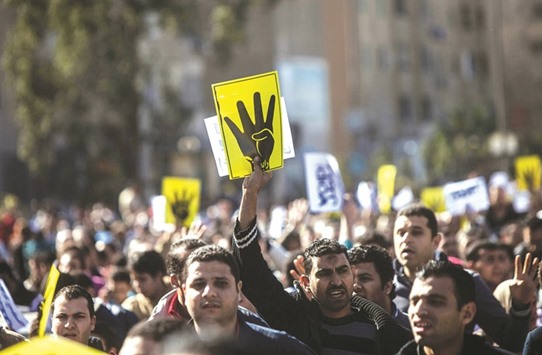On the night of August 13, 2013, Muslim Brotherhood spokesman Gehad Haddad sat in a stairwell of a building next to Cairo’s Rabaa al-Adawiya mosque, and said: “We need a miracle.”
Police moved in to disperse a sprawling Islamist protest camp in the mosque and an adjacent square the next morning, and within 12 hours about 700 demonstrators had been shot dead. Gunmen among the crowds killed around 10 policemen.
Thousands of Islamists, including Haddad and much of the Brotherhood leadership, have been arrested since.
No one in what remains of the organisation, now torn by internal rifts, seems to know how it can recover.
Only five years ago, the Brotherhood was in a very different position.
Its nemesis, the autocratic president Hosni Mubarak, had been overthrown on February 11 in a popular uprising.
The group went from being banned by the regime to winning a presidential election that brought Mohamed Mursi to power in 2012.
A year later Mursi was overthrown by the military after millions demonstrated against his divisive rule.
Islamists staged a sit-in at the Rabaa al-Adawiya mosque to support him, setting off the countdown to the carnage.
Mursi was subsequently sentenced to death after a trial. He has filed an appeal and is now in prison.
“The youths can’t see a horizon, nor a leadership that can achieve anything for them in the face of regime repression,” said Amr Darrag, a senior Brotherhood member exiled in Turkey, and a leader of a faction that opposes the group’s old guard.
“Were we ready to confront the government after Mursi? No. The sit-in should have been disbanded to save lives. We could have held sit-ins in other places,” said Ali, a seasoned Brotherhood member in Cairo.
Ali -- not his real name -- has been protesting ever since. He helps organise small, quick demonstrations in the dusty alleys of a working class Cairo neighbourhood, with lookouts spread across the area to warn them of police movements.
“You have to send a message that the revolution is continuing. As long as the body has a pulse, it can still live,” he said.
Not everyone in the group shares his equanimity. In his Brotherhood cell, known as an usra (family), which comprises about 10 people, some despair.
“Some are depressed. But if someone is depressed, he can talk to someone else who raises his morale.”
Ali has escaped the crackdown by keeping a low profile.
His priority is to maintain a semblance of the Brotherhood’s organisation, even as its members are caught in a confusing struggle between leaders in prison, in exile or in hiding.
The disorganisation has opened the Brotherhood to charges that it is participating in a militant insurgency that has killed hundreds of policemen and soldiers since Mursi’s ouster, in attacks often claimed by militants who also oppose the group.
It has been banned as a terrorist organisation by Egypt.
“In this atmosphere it is plausible that things (attacks) get attributed to you. It’s also plausible that it is you and you don’t know it. Communications on administrative levels are very hard now,” Ali said.
Darrag, whose faction has been accused by the group’s traditional leaders of leaning towards violence, says the struggle is really over having a more representative leadership than the old guard, now mainly represented by the London branch.
“The real reason (for the divisions) is failure,” said Wael Haddara, a former senior adviser to Mursi who is now in Canada. “People have failed to resolve the situation, to win. The country is lost, circling the drain. No one has been able to put forward a realistic path.”
President Abdel Fattah al-Sisi, who as army chief led Mursi’s overthrow, signalled a zero-sum war with the Brotherhood when he suggested the group would be eradicated.
The government has lobbied other countries, especially Britain, to ban the group. Britain ordered a review of the group’s alleged links to violence in Egypt, but apparently uncovered no hard evidence.
Police say there is evidence to suggest Brotherhood members -- current and former -- have taken up arms against policemen, and bomb electricity towers. But it is unclear whether these are local initiatives by Islamists who have given up on protests and want revenge.
“Those who are inclined to engage in armed violence are by definition not a constituency that is going to wait for a green light from the leadership,” said Mokhtar Awad, a research fellow at the Program on Extremism at George Washington University.

A January 24, 2014, file photo of Muslim Brotherhood supporters at a demonstration in Cairo.
